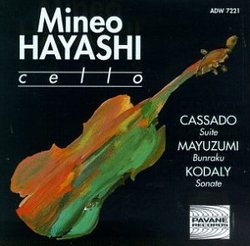| All Artists: Gaspar Cassado, Toshiro Mayuzumi, Zoltan Kodaly Title: Gaspar Cassado: Suite; Toshiro Mayuzumi: Bunkaru; Zoltan Kodaly: Sonate Members Wishing: 0 Total Copies: 0 Label: Pavane Release Date: 5/10/1995 Genre: Classical Styles: Chamber Music, Instruments, Strings Number of Discs: 1 SwapaCD Credits: 1 UPCs: 750582275128, 5410939722129 |
Search - Gaspar Cassado, Toshiro Mayuzumi, Zoltan Kodaly :: Gaspar Cassado: Suite; Toshiro Mayuzumi: Bunkaru; Zoltan Kodaly: Sonate
 | Gaspar Cassado, Toshiro Mayuzumi, Zoltan Kodaly Gaspar Cassado: Suite; Toshiro Mayuzumi: Bunkaru; Zoltan Kodaly: Sonate Genre: Classical
|
Larger Image |
CD Details |
CD ReviewsGreat works, but that sound .... Czinczar | Southeast Michigan, USA | 02/15/2005 (3 out of 5 stars) "The Cassado Suite and the Kodaly Sonata are two great pieces to have on one CD. That alone makes this a worthwhile album. But there are also some things here that will interfere with your enjoyment of them.
It's the overall sound. Hayashi's cello is completely lacking in warmth. What's the origin of this problem? It could be Hayashi's interpretation. He gives a straightforward, almost sterile reading, with little vibrato. He doesn't bother of give us a personal interpretation with much of any expressive phrasing. But I don't think the problem lies here. I also don't think the problem is in the studio's acoustics. I think the problem is in the engineering. I quote the liner notes: "The sound pick-up system used for this recording is an entirely new concept of microphone called the MATRIXED PRESSURE TRIPLET." They go on to rhapsodize about the accurate, realistic sound this technique produces. In my opinion, if this recording is the result, then their self-praise is a bunch of baloney. There is too much treble and not nearly enough bass. No warmth or fullness. Just a comment about Mayuzumi's "Bunraku." This kind of piece may have been chic in it's dissonance in 1960, but 21st century audiances have passed through that phase. They won't find much left to enjoy in this piece. I've given you my personal opinions on Hayashi's technique and the sound of the recording system. On the chance that you may not share my personal opinion, I'll give this recording the benefit of the doubt and recommend it. But I've given you my own subjective warning of what you'll encounter. So listen to the samples and decide if you want to take a chance with this recording." |

 Track Listings (7) - Disc #1
Track Listings (7) - Disc #1